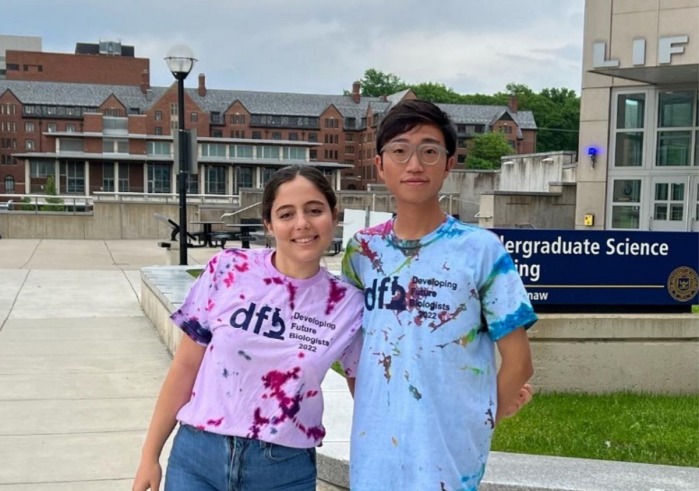Life Sciences Students Participate in the University of Michigan’s Developing Future Biologists Program

Before SUA, Quang Pham ‘24 never imagined he would want to pursue research. Two years into his education at Soka, Pham, along with Sofia Vitale ‘25, was among 25 students accepted to the University of Michigan’s weeklong Developing Future Biologists program in May.
“They actually talked a lot about what we did in Integrated Biology and Chemistry,” Pham said, referring to a prerequisite class taught by Professor Susan Walsh and Professor Robert Levenson in the Life Sciences concentration at SUA.
Pham and Vitale took this class in the spring of 2022, where they worked on problem sets and wet labs to apply what they learned to real case studies.
During the weeklong program at Michigan, students received a comprehensive education in the foundational concepts of developmental biology from leaders in the field in small classes with a 3:1 student-to-instructor ratio. They spent each morning learning about embryogenesis, organogenesis, signaling pathway mutations, or development and disease. Multiple morning workshops also informed students about career options in science.
In the afternoons, they used cutting-edge techniques and model organisms to hone their laboratory research skills in a mixture of dry and wet labs. Students coded with R and ImageJ in the dry labs and performed experiments with model organisms like drosophila, zebrafish, and mouse embryos in the wet labs. The evenings centered around informal activities like bowling, tie-dying t-shirts, and picnicking in a park so that students could bond with each other.
Vitale, who currently studies reflectin proteins as a research assistant under Prof. Levenson, said the program was life-changing. “It was fully funded, which made it possible for me to attend,” Vitale said.
Reflecting on the courses that led him to the program, Pham singled out a marine biology course taught by Professor Marie Nydam that sparked his interest in ecology and evolution. The class visited tide pools in Dana Point to measure the diversity of organisms, including sea stars, barnacles, and sea anemones. Pham went on to work in Nydam’s lab in the spring of 2022, and he plans to continue working over the summer. Having the opportunity to talk with professors and work in the lab helped him realize his interest in and talent for research.
Participating in the program motivated Vitale to consider research as a potential career path. For Pham, exploring Michigan’s graduate-level labs and speaking with professors, PhD students, and other undergraduates encouraged him to become a scientist.
“I was able to enjoy my learning experience [at the University of Michigan] because I had a strong foundation,” said Pham, a foundation he attributes to his studies at Soka.
—Nugnandini Chhetri ’25
